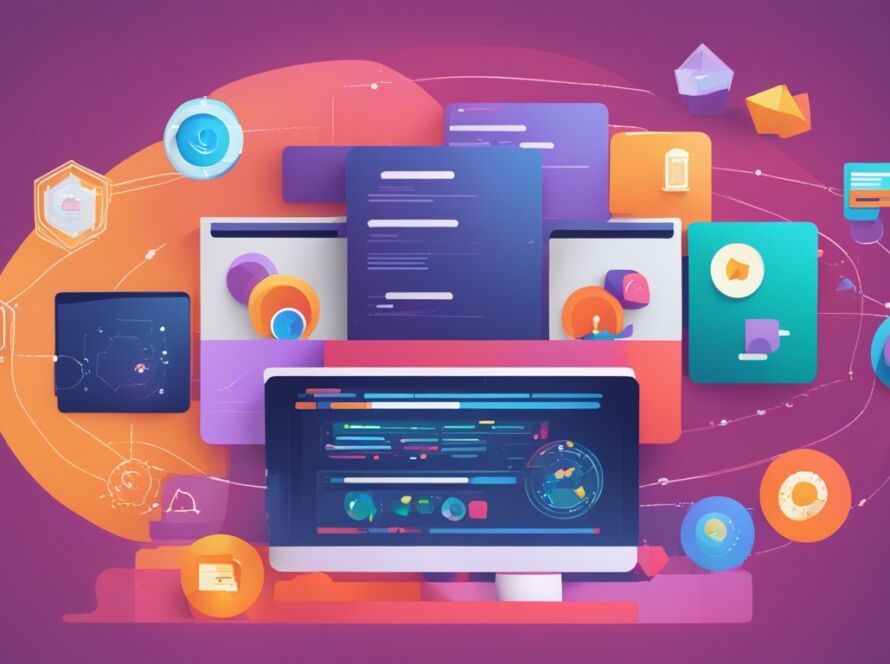In today’s fast-paced digital landscape, content is king, and creating compelling, engaging content is more important than ever. But with the demands of producing high-quality content consistently, many marketers and content creators find themselves grappling with time constraints and creative blocks. Enter artificial intelligence (AI), a game-changer in the world of content creation. In this article, we’ll delve into the realm of AI-powered tools for content creation, exploring their benefits, functionalities, and how they can revolutionize your content strategy.
Introduction to AI in Content Creation
In the ever-evolving landscape of content creation, AI has emerged as a powerful ally for marketers and content creators alike. By leveraging machine learning algorithms and natural language processing, AI tools can generate, optimize, and personalize content with remarkable speed and accuracy. But what exactly are AI tools, and how do they fit into the content creation process?


Bridging the Gap Between Automation and Creativity
AI tools for content creation serve as a bridge between automation and creativity, allowing marketers to streamline repetitive tasks while freeing up time and energy for strategic thinking and ideation. Whether it’s generating blog posts, crafting social media captions, or optimizing website copy, AI empowers content creators to work smarter, not harder.
The Evolution of Content Creation: From Manual to Machine
Gone are the days of manual content creation processes that were labor-intensive and time-consuming. With the advent of AI technology, content creation has undergone a paradigm shift, enabling marketers to produce high-quality, engaging content at scale. From simple text generation to complex content optimization, AI has revolutionized the way we approach content creation.
Tracing the Transformation of the Content Landscape
The rise of AI in content creation can be attributed to advancements in machine learning, natural language processing, and neural networks. These technologies have enabled AI systems to understand and mimic human language patterns, resulting in the development of sophisticated content generation tools that rival human creativity and efficiency.
Harnessing the Power of AI: Benefits and Advantages
The benefits of using AI tools for content creation are manifold, offering marketers a competitive edge in today’s digital marketplace. From increased productivity to improved content quality, AI-powered solutions bring a host of advantages to the table.
Unlocking Efficiency, Scalability, and Innovation
One of the primary benefits of AI tools is their ability to streamline the content creation process, allowing marketers to produce more content in less time. Additionally, AI enables scalability, allowing businesses to meet the growing demand for content without compromising quality. Furthermore, AI fosters innovation by providing access to advanced features such as sentiment analysis, topic clustering, and personalized recommendations.
Types of AI Tools for Content Creation
AI tools for content creation come in various shapes and sizes, each designed to address specific needs and objectives. From AI-powered writing assistants to content optimization platforms, there’s a tool for every aspect of the content creation process.
SHEIVANI
Exploring a Multitude of Options for Every Need
- AI Writing Assistants: These tools use natural language processing algorithms to generate coherent, grammatically correct text based on user inputs.
- Content Optimization Platforms: These platforms analyze existing content and provide recommendations for improving readability, SEO, and engagement.
- Content Generation Tools: These tools use AI to generate content from scratch based on predefined parameters such as keywords, topic, and tone.
- Personalization Engines: These tools use machine learning algorithms to deliver personalized content recommendations based on user behavior and preferences.
Factors to Consider When Choosing an AI Content Tool
With a plethora of AI tools available in the market, choosing the right one for your needs can be daunting. To make an informed decision, it’s essential to consider several factors, including features, pricing, usability, and support.
Navigating the Maze of Features, Pricing, and Usability
When evaluating AI content tools, consider the specific features and functionalities that align with your content strategy objectives. Additionally, assess the pricing structure to ensure it fits within your budget constraints. Lastly, evaluate the usability of the tool, including user interface, ease of integration, and customer support options.
Integrating AI Tools into Your Content Strategy
Once you’ve selected the right AI tools for your needs, the next step is to integrate them into your content strategy effectively. By leveraging AI tools strategically, you can maximize their impact and drive tangible results for your business.
Maximizing Impact and Seamlessly Integrating Automation
To maximize the impact of AI tools, start by identifying areas of your content creation process that can benefit from automation. Whether it’s generating blog post outlines, optimizing meta tags, or personalizing email campaigns, look for opportunities to leverage AI to streamline workflows and enhance efficiency. Additionally, invest time in training and upskilling your team to ensure they can effectively utilize AI tools to achieve your content marketing goals.

Overcoming Challenges and Misconceptions
While AI holds immense potential for revolutionizing content creation, it’s not without its challenges and misconceptions. From concerns about job displacement to skepticism about AI’s creative capabilities, addressing these issues is crucial for fostering trust and adoption.
Addressing Concerns and Embracing the Future of Content Creation
To address concerns about job displacement, emphasize the role of AI as a complement to human creativity rather than a replacement. By empowering marketers and content creators with AI tools, businesses can unlock new levels of productivity, innovation, and competitiveness. Additionally, educate stakeholders about the capabilities and limitations of AI, dispelling misconceptions and fostering a culture of experimentation and collaboration.
5 Best AI Tools to Create Content
- TextCortex: Is an AI-powered writing assistant that improves your writing in various ways, including rewriting, summarizing, answering questions, checking for plagiarism, and generating different creative text formats.
- Benefits: Text Cortex is a browser extension, desktop, and mobile app. It also integrates with various word processors, such as Microsoft Word, Google Docs, and Scrivener. Check it out here!
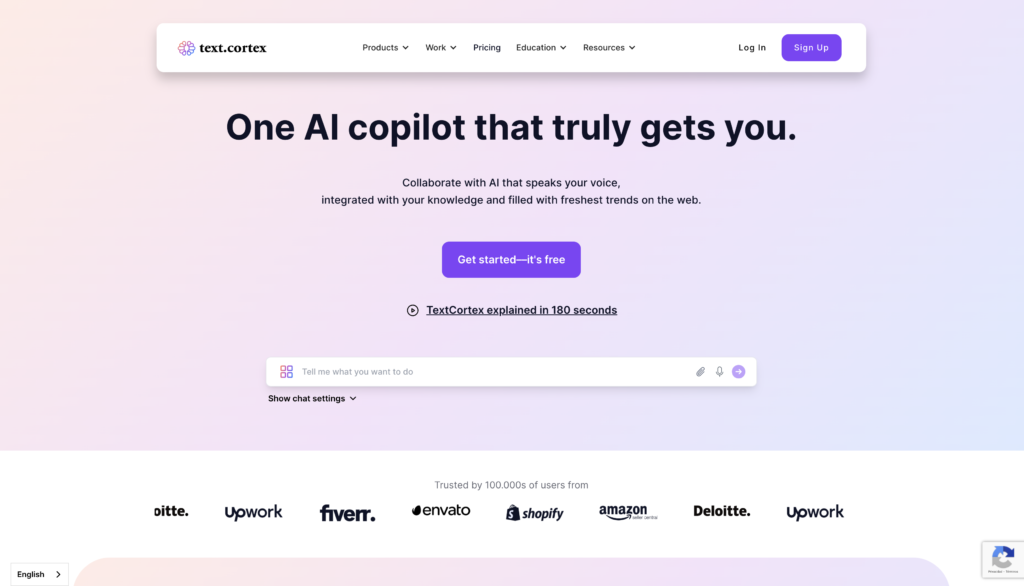
- Frase: Frase is an AI-driven content optimization and analytics tool designed to help marketers, writers, and businesses create high-quality, search-engine-optimized briefs and articles. It generates data-driven insights and content ideas by analyzing user intent and top-ranking search results for better audience alignment.
- Benefits: Frase’s content editor simplifies the writing process by offering real-time suggestions on keyword usage, readability, and topic coverage. Additionally, its question research feature helps users identify relevant questions their target audience is asking, ensuring that the content effectively addresses users’ needs. Check it out here!
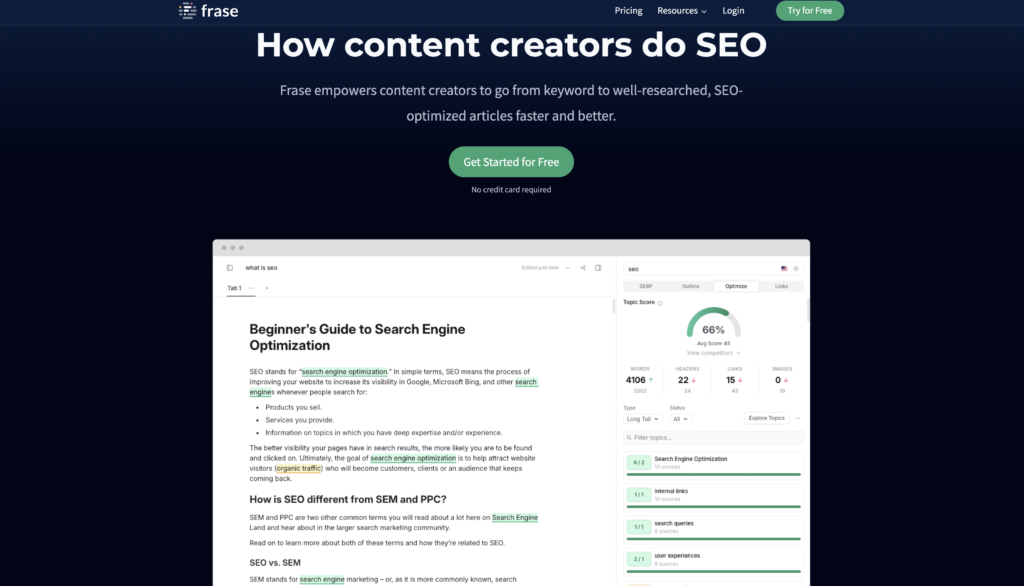
- Jasper: Jasper is an AI copywriter and content generator for businesses. It trains itself on your writing style so you consistently generate on-brand content across your team. Jasper can help you create blog posts, marketing copy, sales emails, SEO content, Facebook ads, web content, love letters, captions, and video scripts. Additionally, it can read and write content in over 29 languages to support your international marketing activities.
- Benefits: Jasper Chat is a conversational way of interacting with generative AI. Instead of having to think in commands or strict prompts, you can converse with AI and refine responses with each engagement. Check it out here!
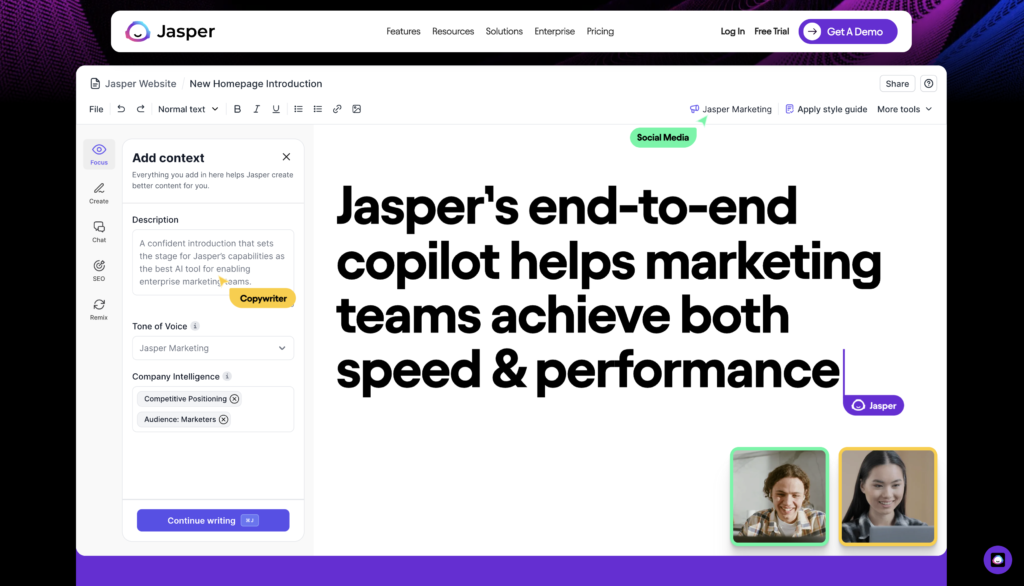
- GetGenie: GetGenie is an AI-powered content writing and SEO assistant that helps you generate and optimize content for your website or blog. It also has a WordPress plugin. It’s an excellent choice for content creators of all levels, from beginners to experienced professionals.
- Benefits: GetGenie’s features include content generation, creative writing support (writing poems, stories, scripts, etc.), SEO tools for keywords, phrases, and readability, competitor analysis, templates, and plagiarism checking. Check it out here!
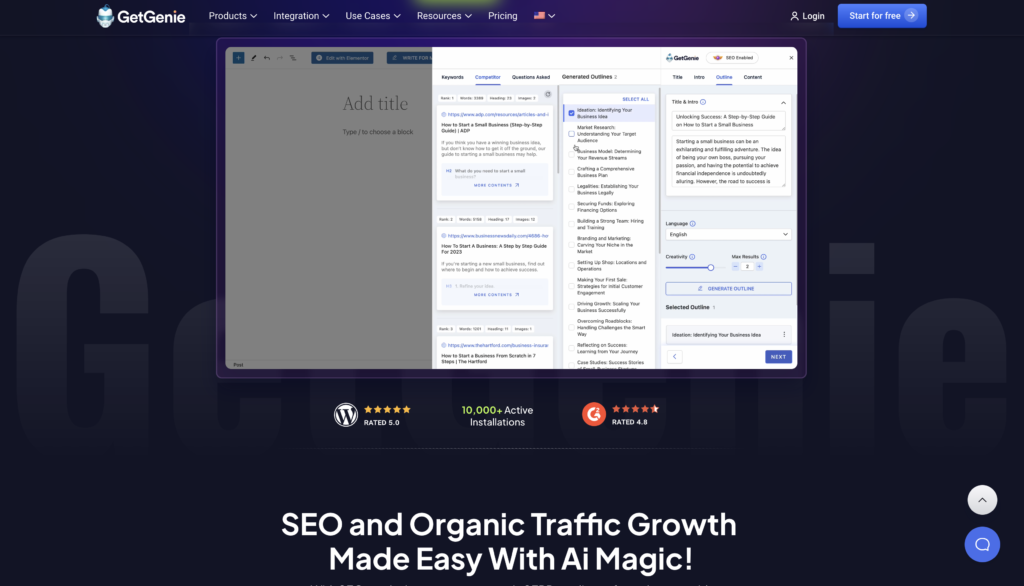
- AISEO: Whether you are new to content writing or a seasoned expert, AISEO can help you generate high-quality content optimized for search engines, making it easier for your target audience to find you online. It’s used by 250,000+ marketers, writers, and entrepreneurs.
- Benefits: AISEO’s article writing and paraphrasing tools help elevate your E-E-A-T score, refine on-page and technical SEO, and stand out in your sector. Free templates and generators are available to help users. Check it out here!
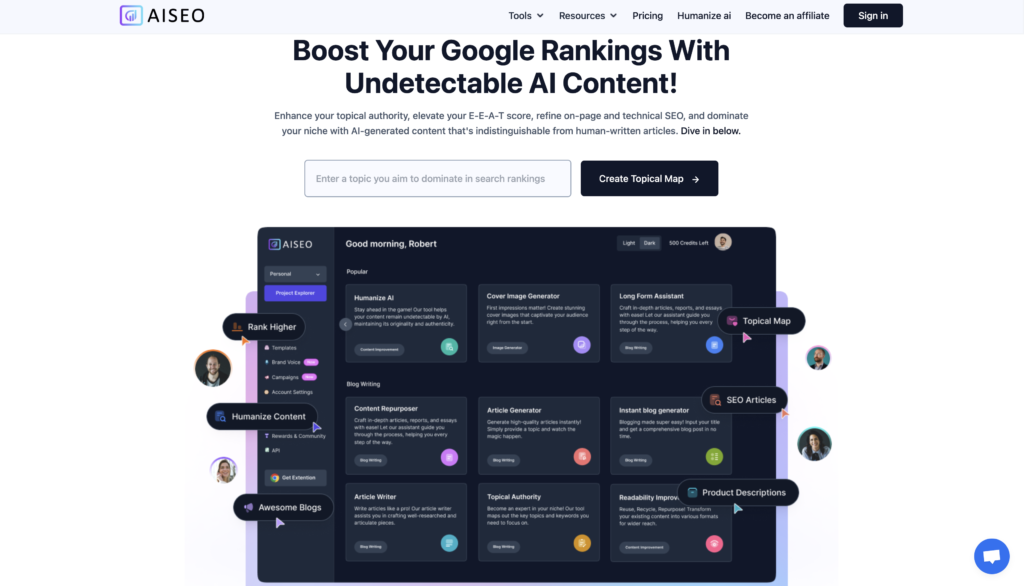
Conclusion: Embracing AI for Unleashing Creative Potential
As we’ve seen, AI has the power to revolutionize content creation, offering marketers unprecedented opportunities for efficiency, scalability, and innovation. By embracing AI tools strategically and overcoming challenges, businesses can unlock their creative potential and stay ahead of the curve in today’s dynamic digital landscape.
These AI tools represent just a glimpse of the vast ecosystem of AI-powered solutions available for content creation. Whether you’re looking to generate blog posts, optimize website copy, or personalize marketing campaigns, there’s an AI tool out there to suit your needs and unlock your creative potential.
Frequently Asked Questions (FAQs)
1. Are AI tools capable of replacing human content creators entirely?
While AI tools have made significant strides in automating certain aspects of content creation, they are not capable of replacing human creativity and expertise entirely. AI excels at tasks such as generating text based on predefined parameters and optimizing content for search engines, but it lacks the nuanced understanding, emotional intelligence, and cultural context that humans bring to the table. Ultimately, the most effective content strategies often involve a combination of AI-powered automation and human creativity.
2. How do AI content tools ensure content quality and originality?
AI content tools employ various techniques to ensure content quality and originality. For example, they may use algorithms to analyze language patterns, detect plagiarism, and generate unique content based on existing data. Additionally, many AI tools offer customization options and quality control features that allow users to fine-tune content outputs and maintain editorial standards.
3. Can AI tools be integrated with existing content management systems (CMS)?
Yes, many AI tools for content creation offer integrations with popular content management systems (CMS) such as WordPress, Shopify, and HubSpot. These integrations allow users to seamlessly incorporate AI-generated content into their existing workflows, whether it’s creating blog posts, product descriptions, or social media content. By leveraging APIs and plugins, businesses can maximize the efficiency and effectiveness of their content creation processes.
4. How do AI tools handle language nuances and cultural sensitivities?
AI tools utilize advanced natural language processing (NLP) algorithms to understand language nuances and cultural sensitivities. These algorithms are trained on vast datasets containing diverse language patterns and cultural references, enabling AI systems to generate content that is contextually appropriate and culturally sensitive. Additionally, many AI tools offer customization options that allow users to tailor content outputs to specific audiences and demographics.
5. What are the potential drawbacks or limitations of using AI tools for content creation?
While AI tools offer numerous benefits for content creation, they also have potential drawbacks and limitations. Some common challenges include:
- Overreliance on Templates: AI-generated content may lack originality and creativity if users rely too heavily on predefined templates and parameters.
- Bias and Inaccuracy: AI algorithms are susceptible to biases inherent in training data, which can result in inaccurate or biased content outputs.
- Limited Understanding of Context: AI tools may struggle to grasp complex linguistic nuances, cultural references, and situational context, leading to errors or misunderstandings in content generation.
It’s essential for users to exercise caution and critical thinking when utilizing AI tools for content creation and to supplement AI-generated content with human oversight and editorial review to ensure quality and accuracy.

